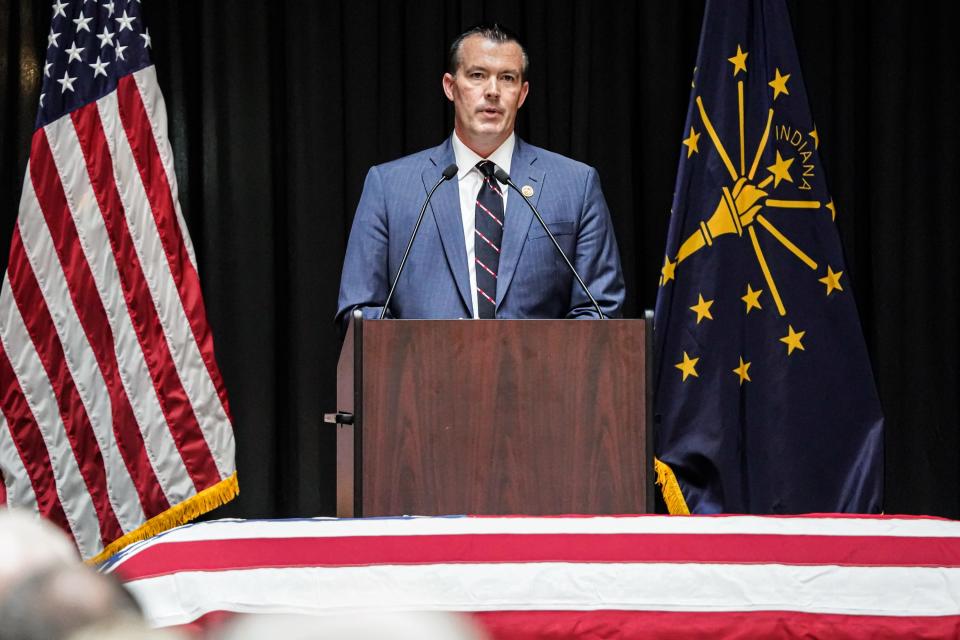Lawmaker said HEPL open door opinion shows overreach of public records official
Update March 6: The House voted 58-36 to agree with the Senate's changes to House Bill 1338, which included the language limiting the interpretive powers of the public access counselor. The bill now heads to the governor.
"If there's a gray area in the law, that is why we're here, to clear that up," bill author Rep. J.D. Prescott, R-Union City, said on the floor Wednesday.
In the eyes of Indiana's public access counselor, two members of the Hamilton East Public Library board violated open meeting laws last year when they met with their attorneys at a coffee shop.
In the eyes of some state lawmakers, this interpretation was one opinion that went a bridge too far. Lawmakers quietly tacked language onto a House bill this week to curtail the public access counselor's interpretative powers.
"I’m not saying the Hamilton County situation was the straw that broke the camel’s back," Sen. Aaron Freeman said about the amendment he presented. "I’m saying it was probably one of a long line of things."
Government accountability advocates, though, say the amendment would severely limit the powers of the state’s appointed expert on public records and open meeting laws.
The public access counselor is a nonpartisan role with responsibilities that include issuing advisory opinions when a person or agency has questions about Indiana’s public records or open meeting laws. Luke Britt, the current public access counselor, was appointed in 2013 by former Gov. Mike Pence and reappointed by Gov. Eric Holcomb.
Freeman's amendment would require the public access counselor to only consider the exact text of Indiana’s access laws or applicable court cases when issuing advisory opinions.
The Senate's Corrections and Criminal Law committee voted Tuesday to add the change to House Bill 1338, from Rep. J.D. Prescott, R-Union City, which gives guidelines to local governments on how to deal with disruptive conduct at public meetings.

Freeman told IndyStar he introduced the amendment because he thinks there have been recent opinions from Britt’s office “that have taken some liberties.” He said he did not talk to Britt about the amendment.
“I think certainly it’s fair to say there’s been some very liberal interpretations of the statute,” Freeman said.
Freeman was the subject of a 2021 complaint from a man who alleged the senator violated the Access to Public Records Act when Freeman blocked the man from viewing his Twitter account. Britt, in that advisory opinion, concluded that Freeman did not violate the law.
Britt declined to comment to IndyStar about pending legislation before the General Assembly, but government transparency advocates said the current process for the public access counselor to issue opinions works just fine.
“If the Public Access Counselor can’t issue an opinion because the law is too vague and can’t make an interpretation, that’s stifling and that’s a chilling effect,” said Zachary Baiel, president of the Indiana Coalition for Open Government. “I don’t think that’s beneficial to open, accessible and accountable government.”
Prescott, who authored the original bill, did not respond to IndyStar questions sent to his office about the amendment prior to the deadline for this story.
HEPL ruling a "liberal" interpretation
Freeman pointed to the ruling last summer from the Public Access Counselor on the conduct of members of the Hamilton East Public Library Board as one example of his concern the office was “liberally” interpreting state laws.
In an October opinion, Britt stated that former HEPL board members Ray Maddalone and Laura Alerding violated Indiana’s Open Door Law when they met with the board’s attorneys at a local coffee shop in August.
IndyStar reported on the meeting between the board members and attorneys in August after a Fishers resident took a photo in the coffee shop and posted it on X, formerly known as Twitter. The photo was followed with posts alleging that Maddalone and Alerding discussed library business.
October opinion: HEPL board members met at a coffee shop. Public access expert says it broke Open Door Law.
Britt ruled in October that Maddalone and Alerding made up two-thirds of a library board committee. The HEPL board at the time was facing heavy backlash for its policy to move books labeled “inappropriate” from the library’s teen section.
But Freeman said that situation should not have been considered a public meeting.
“Good god, we never intended the Open Door Law to apply to two people having lunch,” Freeman said.
Advocates say amendment unnecessary
Baiel, with the Coalition for Open Government, said he believes the Public Access Counselor already interprets the plain text of public access laws and said he worries lawmakers may want to target “the spirit of the law” in the future.
“You have to interpret,” Baiel said. “Not every case is in there. Not every scenario is laid out for you.”
The Public Access Counselor needs the ability to consider the context of how laws are used by the state and local governments, said Amelia McClure, executive director of the Hoosier State Press Association, which is opposed to the amendment.
Public access: How to request a public record in Indiana
State code does not consider new technology that governments may use and could impact public access, she said. Using only the plain text does not give that leeway, McClure said.
“He needs to be able to use common sense,” she said.
McClure said the Public Access Counselor’s current abilities helps ensure governments are transparent about policies and decisions. The amendment limiting the office's power could make it harder for Hoosiers to understand the actions of public agencies, she said.
“It’s a little amendment that has a big effect,” McClure said.
Contact IndyStar's state government and politics reporter Brittany Carloni at [email protected] or 317-779-4468. Follow her on Twitter/X @CarloniBrittany.
This article originally appeared on Indianapolis Star: Indiana public records official target of amendment to House Bill
Solve the daily Crossword

